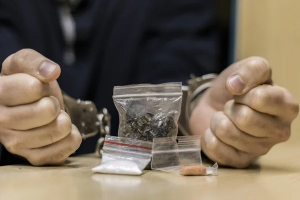
Are you facing a drug possession charge and want to know how to get the drug possession charge dropped? Are you worried about the impact of having a drug possession case on your professional and personal life?
Having drug possession charges on your record has a lasting impact. It can prevent you from getting your dream job, getting into the school you want to attend, or being approved for renting a home or an apartment.
You must contact a criminal defense attorney many people trust as their drug possession lawyer. Contacting a drug crime attorney can get the drug possession charge dismissed is crucial if you want to have your lawyer fight for you and protect your rights.
A common way to get charged with drug possession is when a law enforcement officer pulls you over for a traffic violation and discovers that you own an illegal drug or a controlled substance.
Another scenario is when someone calls the police on you, and the responding police officer finds drugs on your person. You get arrested, read your rights, and booked into the local jail. You have an arraignment, and bail is set for you.
When you get a drug possession charge, it may be classified as a misdemeanor possession charge or a felony drug charge. Whether you are charged with misdemeanor or felony drug charges, you need an experienced defense attorney.
The drug defense attorney can answer your questions about how to get drug possession charges dropped from your record. The penalty for drug crimes can be serious, depending on the nature of the drug charge.
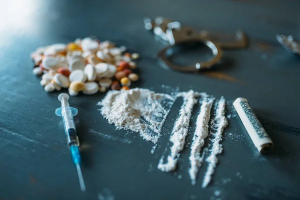
Drug crimes are violations of the law that are related to drugs. It can include illegal possession, drug possession for sale, manufacturing an illegal drug or controlled substance, or drug trafficking charges.
A drug crime in California is likely to consist of more statutes and violations than many people are likely to realize until they get arrested for charges related to possessing illegal drugs.
Did you know that you may be charged with a drug crime in some cases, even if you are found with drugs for which you have a valid prescription? Law enforcement officers often include possession of drug paraphernalia charges when they charge someone violating drug laws.
California has different drug laws for each type of drug crime. The state has a variety of established regulations for drug possession charges.

Possession of marijuana is one of the most common drug charges. You can legally possess up to one ounce, 28.5 grams of marijuana in California if you are 21 or older, or up to eight ounces of marijuana concentrate for adult use, have a valid physician's recommendation, or have a county-issued medical marijuana identification card.
Several restrictions still make possession illegal. You cannot possess more marijuana than allowed by law or keep or use marijuana on federal lands such as national parks.
Marijuana possession that violates the current law may be a misdemeanor or felony, depending on several factors. You need an attorney with experience getting drug possession charges dropped when you face marijuana possession charges.
Law enforcement officers often include possession of drug paraphernalia charges when they charge someone violating drug laws. Drug paraphernalia is anything used to grow, produce, or manufacture a controlled substance. It includes anything used to prepare, process, package, store, conceal, or consume controlled substances.
Common items that a uniformed police officer or undercover police officer may consider drug paraphernalia include:

The Health and Safety Code governs possession of a controlled substance in California – HSC, CHAPTER 10. Control of Users of Controlled Substances [11550 - 11594], Article 1. A controlled substance is any highly controlled drug because of its high likelihood of causing drug addiction or abuse.
The law lists controlled substances by schedules, classifying them from Schedule I to Schedule V drugs, from the most addictive to the least addictive or dangerous drugs. Possession of a controlled substance may include charges related to marijuana, prescription drugs, dangerous drugs, inhalants, peyote, or narcotic drugs.
Drug possession charges can apply to either actual possession or constructive possession. Actual possession refers to the drug actually being on your person.
Constructive possession is commonly seen when multiple individuals are involved, such as when a police officer pulls over a car, several people are in the car, or when law enforcement is called to a scene where there are multiple people. The drug is not under the person's control, such as in the trunk of a vehicle or somewhere in the home.
A possession-for-sale charge involves someone possessing an illegal substance and intending to sell it. A person charged with possession for sale has a large number of drugs, or many drugs, indicating that they were for sale.
You can still face possession charges for sale even if that was not your intent if the amount of drugs you have meets the threshold.

The illegal manufacture of a controlled substance is illegal and subject to potentially serious charges and penalties under the law. You can face felony charges if you illegally manufacture, produce, or process illegal drugs.
Some common drugs manufactured or produced include:
The prosecutor has the burden of proving that you knowingly possessed the products needed to manufacture the drugs and intended to manufacture the drugs.
Drug trafficking refers to importing, exporting, transporting, or selling a controlled substance. It is a serious drug charge that can result in a person spending time in prison, along with other consequences. It involves a much larger amount of drugs when compared to drug dealing charges.
The consequences often depend on the type of drug and the quantity of the drug that resulted in the charges.
The penalties that you may face for felony drug charges vary according to the specific drug charge and depend on factors such as the type of drug involved, the amount of the drug, previous convictions, and the drug crime laws. The penalties for drug-related charges typically include jail or prison time, probation, and paying fines.
Marijuana possession penalties, for example, are divided into categories, such as the amount of the drug possessed and whether it was for personal use, sale, production, or transport.
Charges related to the illegal manufacturing of drugs can result in spending time in jail, depending on the specific drug involved and any prior offenses.
Your criminal defense lawyer can offer a possible defense to your drug possession charge. You should contact an experienced attorney to help you provide a defense for the drug charge.
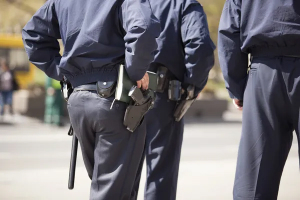
The Fourth Amendment of the U.S. Constitution protects people from illegal search and seizure actions. Police or other law enforcement officers cannot enter your home without probable cause and a warrant. They cannot search you without your permission and probable cause.
Any evidence seized during an illegal search or seizure could be inadmissible against you in court.
Law enforcement officers are required to read you your Miranda rights at the time that they arrest you. They must read it in its entirety.
If they fail to do so, this qualifies as a Miranda rights violation. It could result in getting anything you say thrown out.
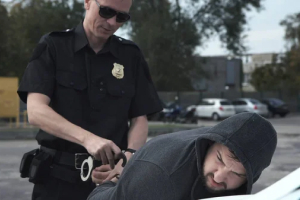
Entrapment is an affirmative defense to drug charges. The defendant has the burden of proof in an entrapment defense.
Entrapment happens when a police officer or undercover officer sets a person up to commit a crime that the person otherwise would not have committed, except for the officer inducing the person to commit it.
The U.S. Department of Justice explains that entrapment is a "complete defense to a criminal charge" because government agents are not permitted to "originate a criminal design, implant in an innocent person's mind the disposition to commit a criminal act, and then induce commission of the crime so that the government may prosecute" the person.
Your criminal defense attorney may be able to get the drug possession charges dropped if there was entrapment in your case.
The attorney at Hurwitz Law Group, representing you on your drug possession, drug trafficking, or other drug charges, can often get a plea agreement. A plea bargain means that the charges are lowered to a less serious offense, or some charges may be dropped.
Taking a plea bargain often results in more minor fines and less or no jail time. You may get sentenced to a drug treatment program rather than a prison sentence or jail time.
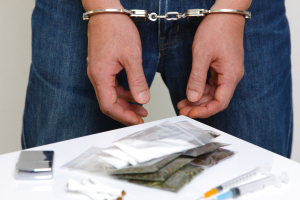
Police may arrest you because they find a substance that looks like an illegal drug. Something that "looks like" a drug is an insufficient evidence for a guilty verdict.
The substance must be tested in a crime lab for analysis. You can likely beat a manufacturing charge if the state fails to prove the substance is illegal.
A lack of possession is a common defense when you say the drugs belonged to someone else. The lack of possession defense often occurs when someone is charged with a drug distribution offense.
A typical example is if you are riding in a car as a passenger or borrow a car, get pulled over, and the police find drugs in the glove compartment, the trunk, or another area of the vehicle. Finding the drugs does not mean that they belong to you. The state must prove that the drugs belonged to you.

Did you get charged with possession because you put a couple of extra pills in your purse so that you did not miss the time that you needed to take your prescribed medication? Perhaps you have a medical marijuana prescription.
If you can prove you have a valid prescription for the drug or drugs in question, ask your attorney how to get drug possession charges dropped.
The state has the burden of proving the details of your drug case, including your knowledge and your intent. If the state cannot prove that you knew the drugs or intended to distribute them, it may result in dropped charges.
The answer is "yes," drug possession charges can be dropped. Still, you need an attorney who knows how to get the charges dropped, how to prove reasonable doubt, and how to show that you had a valid prescription and did not possess an illegal substance.
Contacting Hurwitz Law Group as soon as possible is essential because the sooner we start working on your case, the more time we have to prepare your defense.

At Hurwitz Law Group, we are a compassionate and sympathetic law firm but fight hard for our clients. We are a team of accomplished negotiators who use our talent to get the best possible results for every client.
We are a compassionate and sympathetic law firm, but we fight hard for our clients. We are a team of accomplished negotiators, and we use our talent to get the best possible results for every client.
Call us at (323) 747-7484 to schedule your free, confidential consultation.
Search
Categories